Ljubljana related
The covers and editorials from leading weeklies of the Left and Right for the work-week ending Friday, 31 May 2019
Mladina: The poor election results of the Left
STA, 31 May - Analysing the poor showing of the opposition Left in Sunday's EU election, the weekly Mladina says that rather than by a negative attitude it received from the media, the party was affected by the choice of candidates on its list, in particular Violeta Tomić as the frontrunner.
Although faced with constant opposition from all parties bar the Marjan Šarec List (LMŠ) and Pensioners' Party (DeSUS) and a negative attitude of the media, the Left has managed to create a base of voters for itself among intellectuals, urban population and leftists.
Its cooperation with the government also did not harm its public ratings, Mladina editor-in-chief Grega Repovž notes in Friday's editorial.
So the reason for the party's election result must lay in its list of candidates, which was topped by Tomić, who has not been received well by the voters.
"People are put off by her appearance, which intentionally or unintentionally comes across as rough and thus unpleasant to most voters of the Left."
Although the views she advocates are completely in order, she simply does not leave a positive impression, Repovž says. "A large part of voters of the Left will not vote for her or would do so with unease. She is therefore simply not the right top candidate."
If a stronger candidate topped the list, which was solid and no worse than those of other lists running in the election, the Left might have won more votes. But with Tomić in the lead, the whole list lost credibility.
"Unfortunately that was not the only mistake. The party put its president (Luka) Mesec in the last spot - as a kind of public recognition that the party itself does not believe in its list. Voters perceived this as underestimating."
Winning a seat in the European Parliament is important and the Left was left without one entirely by its own blame. The poor election result also made the party weaker in the domestic political arena, Repovž says under the headline The Left.
Demokracija: EU elections mean PM on his way out
STA, 30 May 2019 - Examining the Eurovote results in its commentary on Wednesday, the right-wing weekly Demokracija says that the days of Prime Minister Marjan Šarec are numbered because he would not form alliances with other parties. This cost Igor Šoltes, the grandchild a late senior Communist Party official, his seat in the European Parliament.
Demokracija editor-in-chief Jože Biščak says under that headline Tick-Tock, Tick-Tock, Tick-Tock... that Šarec will never be forgiven by the deep state for costing Edvard Kardelj's grandchild his MEP seat.
The paper says that the people who "made a comedian a prime minister" failed at creating a liberal bloc that would comprise the Marjan Šarec List (LMŠ), the Alenka Bratušek Party (SAB), the Modern Centre Party (SMC) and the Pensioners' Party (DeSUS) for the Eurovote.
Despite support from the mainstream media, Šarec's support has dropped. He lost the election and his party only got two seats in European Parliament.
"If Slovenia was a functioning democracy and the land on the sunny side of the Alps had a rule of law, Šarec would offer his resignation, dissolve the coalition and demand an early election."
"In a year and a half, he lost as many as four elections and with the exception of the presidential vote (which is special), he was always defeated by the Democrats (SDS).
"But because Slovenia is ruled by the deep state and the uncles drawing all the strings do not want to give up their transitional advantages, measures had to be taken to repair the damage."
This meant that left-leaning political analysts went on to proclaim the SD and the LMŠ winners of the election, while the SDS, which ran on a joint ticket with the People Party (SLS) was the loser because one of the three seats won by the coalition went to the SLS.
This perverted logic indicates a poor understanding for how the Eurovote works, Biščak says, going on to explain that election coalitions are a logical decision for EU elections, where success threshold is much higher than in the national parliamentary election.
He says that if New Slovenia (NSi) joined the SDS+SLS coalition, they could have won as many as five of Slovenia's seats in European Parliament. But the "whisperers from the background" managed to persuade NSi president Matej Tonin that he should not be in SDS head's Janez Janša's shadow.
Biščak says that the SDS would get the three MEP seats even if it did not cooperate with the SLS, while the latter could not have gotten a single MEP on its own. This alliance will allow the SLS to become a major national player once again.
Šarec's days are numbered because he refuses to listen, Biščak says, explaining how his refusal to connect with other parties cost Šoltes, who has served as MEP in the previous term, his seat in Brussels.
All our posts in this series can be found here
Milan Zver says EU should do more to fight terrorism
Milan Zver, turning 57 the day before the election, has won his third term in the European Parliament as the lead candidate on the joint slate of the opposition Democrats (SDS) and non-parliamentary People's Party (SLS). The head of the Slovenian EPP delegation has been a member of the EU parliament's committee for culture and education and a member of the delegation for relations with the US in 2014-2019. He is particularly happy that as the rapporteur for Erasmus+ he has managed to increase funds for the EU's programme for education, youth and sport to EUR 45 billion. He is also proud that one of the European Parliament halls was named after Jože Pučnik (1932-2003), a central figure of Slovenia's independence, to whom Zver served as an advisor in the early 1990s when Pučnik was a deputy prime minister. Since he entered politics in the early 1990s he has become one of the most prominent SDS politicians of the past 15 years. An SDS vice-president, Zver, a holder of a PhD in sociology, was elected MP in 2004, but left parliament shortly after to serve as education minister. He was elected to the EU parliament for the first time in 2009. He has written several books, including one on the SDS's history, which was published under the auspices of the EPP in English in 2009. Zver is married to historian Andreja Valič Zver and has two daughters from a previous marriage.

sds.si
STA, 27 May 2019 - In the new term, the re-elected MEP Milan Zver of the Democrats (SDS) will continue with his work in the security and defence policy, while also focusing on education. He has told the STA that the agenda in the European Parliament will also include fight against terrorism, where he believes the EU should make a step forward.
Zver, 57, expects that security issues and illegal migration will remain high on the agenda in the next five-year term of the European Parliament. He sees cybersecurity and the fight against terrorism as the most important points.
He believes that there is a need for a common EU policy in the field of security, either in the form of common armed forces or a common security and intelligence service.
"It is not enough any more that autonomous intelligence services cooperate and coordinate their work. We should make a step forward if we want to be more effective in fighting terrorism and reduce security risks in the EU generally."
Zver is currently a member of the Special Committee on Terrorism, and the other fields he is the most familiar with are youth policy, culture, education and sport, in which he has also been active as a member of the Committee on Culture and Education.
He expects to continue with the Erasmus+ project as "one of the most successful stories in the EU", which has been "sold very poorly" in the political campaign.
Zver also expects that he will lead the national delegation in the European People's Party (EPP), which he labelled as responsible work, especially at the beginning, when new bodies are being established.
Commenting on the emerging social union, he said that "some common standards need to be established as soon as possible so that the social and development differences between the east and west are reduced".
On the other hand, there are fields which Brussels could transfer to member states and give them more powers and independence. "Common agricultural policy should not necessarily be a completely regulated system."
Zver also commented on the situation in which the EU has found itself after the election of British MEPs, who are mainly Eurosceptics. "This is a big problem for the European Union, coming right at the time when it needs to get stabilised."
If the British went to another Brexit referendum, the result could perhaps be different, but the result of the EU election shows that the "Eurosceptic reflex in the United Kingdom is still very strong".
According to Zver, Brexit has become a second-rate topic in the UK, as the British "care more about which party will win a majority in the early election".
Ljudmilla Novak to work for benefit of Slovenia and European integration
Ljudmilla Novak, 59, is returning to the European Parliament after she served as MEP in 2004-2009 together with Lojze Peterle, who today failed to get re-elected for what would be his fourth term. A graduate of Slovenian and German, Novak abandoned her teaching career to enter politics in 2000 by joining the NSi's predecessor, the Slovenian Christian Democrats (SDK), and being elected Moravče mayor in 2001. When the NSi failed to make it to parliament in 2008, she replaced Andrej Bajuk at the helm of the party, where she stayed until resigning in January 2018 to give way to younger-generation Matej Tonin. It was rumoured she stepped down in exchange for being placed high on the slate for the EU election, which she has denied on several occasions. Novak took the NSi to the general election in 2011 and to the surprise of many, the party managed to return to parliament. Given that no party had managed to make it back to parliament before, this is considered her major achievements. In the second Janez Janša government (2012-2013), Novak served as minister for Slovenians abroad, but later distanced herself from the Democrats (SDS), chiefly due to Janša's ill-disposed policies. Novak, currently an MP, is seen as a moderate conservative willing to engage in dialogue. She is married and has three children.
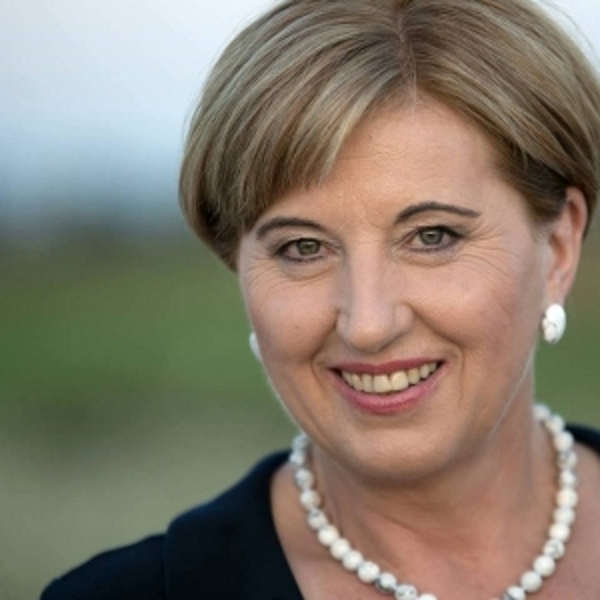
STA, 27 May 2019 - Ljudmila Novak, who is returning to the European Parliament after a ten-year hiatus to join the ranks of the European People's Party (EPP) as the sole MEP for New Slovenia (NSi), would like to focus on culture and education in her new term.
Talking to the STA about her plans and commitments in the European Parliament, Novak pledged to dedicate her "heart to work for the benefit of Slovenia and integration in Europe".
The first topics she will take up as MEP would depend on the agenda, she said, while noting that in her first term as MEP between 2004 and 2009, she spoke out when something went wrong with respect to Slovenia's borders, minorities and similar issues.
In the past, she was active in the fields of culture and education, the fields she would also like to focus on in her second term in the European Parliament. However, since four of the eight Slovenian MEPs are EPP members "we will need to agree yet who represents which field".
The other three Slovenian MEPs from the EPP ranks - Milan Zver, Franc Bogovič and Romana Tomc - have served as MEPs this term so they will probably want to continue their work in the field they committed themselves to, Novak said. It will all be a matter of agreement. "I'll see what I get to choose from."
The 59-year-old former NSi leader says she is aware of the challenges of reconciling her work as MEP, her family life and her political activity in Slovenia. She did note though that MEPs tended to return home on a weekly basis because they needed to keep in touch with the Slovenian citizens.
All the articles in this series are here
Tomc a lot needs to be done for pensions and demographics
An economist by profession, Romana Tomc, 53, was re-elected to the European Parliament as the second-placed on the joint SDS+SLS slate. She was first elected MEP in 2014, which marked the peak of her political career and a rapid rise through the party's ranks at the time, giving rise to rumours she could take the party leadership while Janez Janša was shortly serving time in the Patria corruption case. As an MEP, she has been a member of the committee for employment and social affairs, and a member of the delegation for relations with Japan. She was the rapporteur for the Youth Employment Initiative, one of the main EU financial resources to help fight high unemployment rates among the young, and has fought, though in vain, against Austria's efforts to cut child benefit for Slovenian parents working in Austria but living in Slovenia. MEPRanking.eu, a quantitative analysis of MEP activity, however, shows she has been one of the three least active Slovenian MEPs in this term. In 2017, the SDS fielded her as a presidential candidate, but she failed to advance to the run-off, placing third after Borut Pahor and Marjan Šarec. Drawing on her rich experience from the private sector and employer organisations, Tomc joined the Labour Ministry in 2007, first as the head of the labour directorate and later as a state secretary in the SDS-led government. In 2011-2014, she served as MP, of which two years as deputy speaker. Tomc has a partner and two adult children.
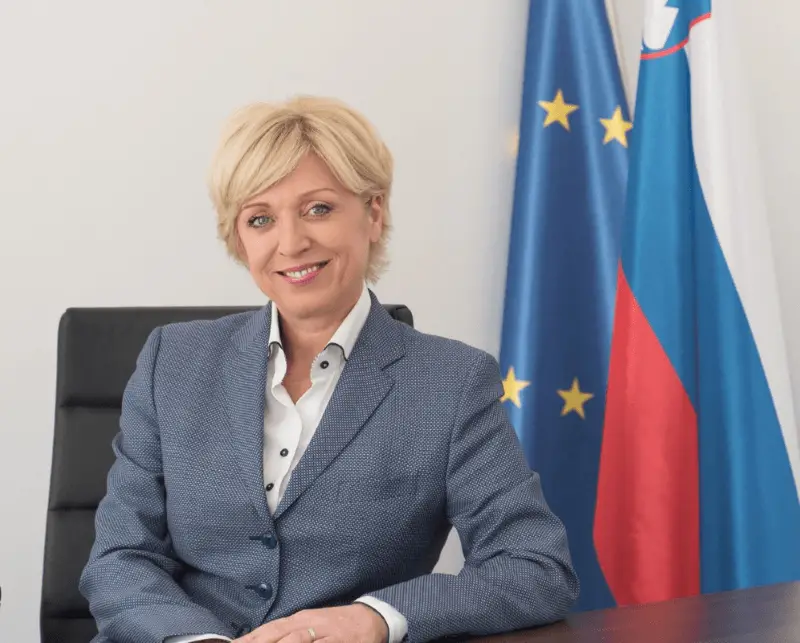
STA, 27 May 2019 - The freshly re-elected MEP Romana Tomc of the Democrats (SDS) has told the STA that a lot of work remains to be done in the EU in the fields of pensions, older people and demographic trends. She intends to keep focusing on these fields in the next term, hoping that she will manage to "put some wheels in motion".
Tomc (53), who was re-elected to the European Parliament as the second-placed on the joint SDS+SLS slate, said her priorities would be connected with the work she had been already performing.
She noted that although she had worked a lot with young people in the outgoing term, she had paid the most attention to pensions, pension systems, demographic changes and population ageing.
She thinks that the EU owes a lot to its citizens in terms of demographic policy and pensions. "If we dealt with things such as clock changes, I think that we can also deal with serious things such as problems in the pension systems in all member states, not only in Slovenia."
Considering that all EU member states have problems in this field, Tomc believes that it is time for the EU institutions to commit to deal more intensively with the challenge.
In countries where governments are not being responsible, these systems are bursting at their seams, assessed the member of the largest opposition party, adding that Slovenia was among them. This is an issue that needs to be regulated anew.
"We discussed the issue of ageing, but did not adopt any measures. I think that we could adopt some binding commitments in this field," she said, while noting she was inclined to setting minimum standards.
Such standards would leave enough manoeuvring space to individual member states, while being means for Brussels to control whether a member state is taking measures they should be taking in order to make its pension system stable.
According to Tomc, the EU has dedicated a lot of money to projects such as bridges and other infrastructure, and now it is time to start investing in people.
As a case of good practice, she pointed to the youth guarantee scheme, for which the EU has earmarked EUR 9 billion. "Why wouldn't we have a guarantee scheme for older people," she wonders.
Milan Brglez will commit himself to human rights
Milan Brglez, 51, was elected MEP with preferential votes despite having just recently joined the SD after defecting from the Modern Centre Party (SMC) of former PM Miro Cerar, which he helped found just before it won the 2014 general election. It was then that Brglez, who has a PhD in international relations, entered politics, before which he was known mainly in academic circles. He was elected MP in 2014 and became parliamentary speaker, a post he held until 2018. During this stint, parliament stripped opposition SDS MP Janez Janša of his term as MP as he was serving time in the corruption Patria defence case, in what was perceived as a rather controversial move. As an expert on foreign relations, Brglez was also a member of the advisory group involved in the preparation of Slovenia's case for the tribunal arbitrating on the border with Croatia. In 2018, he was re-elected to the National Assembly on the SMC ticket, but defected soon over a dispute about the new parliamentary speaker with SMC leader Cerar during the talks on the coalition formation. He is a father of two children.
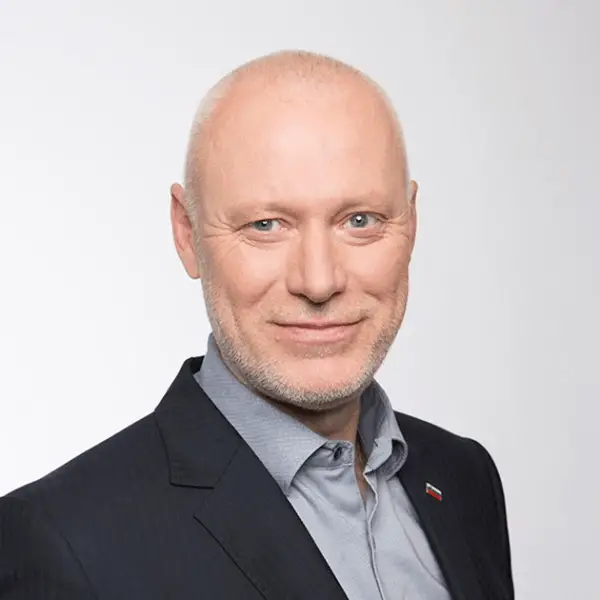
dr-rs.si
STA, 27 May 2019 - Milan Brglez, an international law professor who was elected one of two MEPs for the Social Democrats (SD) on Sunday, says he will dedicate his term to things he knows best, that is issues linked to international relations, international law and human rights, including social rights.
"This is such a surprise that I haven't given it much thought yet," Brglez, who made it to the European Parliament as No 4 SD candidate owing to preference vote, told the STA when asked about his future work.
However, Brglez, who served as the National Assembly speaker in the previous term, said that value added he would bring to the EU parliament was his "commitment to human rights and the rule of law", two topics that he believes are underrated and neglected in the EU.
Having defected to the Social Democrats from the Modern Centre Party (SMC) after the 2018 general election, Brglez says that in the European Parliament he will work toward a clearer social democratic profile, and will also dedicate his time to social rights, where he believes Europe should do much more.
He would like for "certain minimum standards to be adopted in the future so we don't compete for money when it comes to social security". However, a more detailed distribution of tasks will also depend on distribution of European Parliament seats between groups, he noted.
Brglez, who currently serves as deputy in the National Assembly, plans to first complete the work he has started in the Slovenian parliament before devoting his time fully to how he operates within the European Parliament. "Some expertise from this field will certainly help," he added.
Brglez is happy to have won his term with a preference vote. "I gather these are the votes of those new voters who supported social democracy and this was the basic goal that was behind our joint decision for me to stand," said Brglez.
As a result of his election to the European Parliament, the SMC will gain back Brglez's seat in the national legislature, considering that Brglez was elected on the SMC ticket before defecting to the SD last summer.
"That's the logic of parliamentarism, which I believe is right in principle, but as far as the SMC and I are concerned this part of the story is now over," said the 51-year old.
All the articles in this series are here
Klemen Grošelj will work for solidarity and security
Klemen Grošelj, 43, holds a PhD in defence studies from the Ljubljana Faculty of Social Studies. He entered politics last year when he was appointed a state secretary at the Defence Ministry after the general election, and has since authored a new resolution on the national security strategy designed to beef up the national security system at a time of changing global security threats. Elected as the second-placed on Prime Minister Marjan Šarec's LMŠ, Grošelj said during the campaign that EU members should reach agreement on its new strategic areas to be added to the existing ones. He has also said in a recent interview: "I believe in a EU which will have common policies and where the European identity and national identities do not exclude each other." Before turning to politics, Grošelj was best known for his analysis of global geostrategic developments.
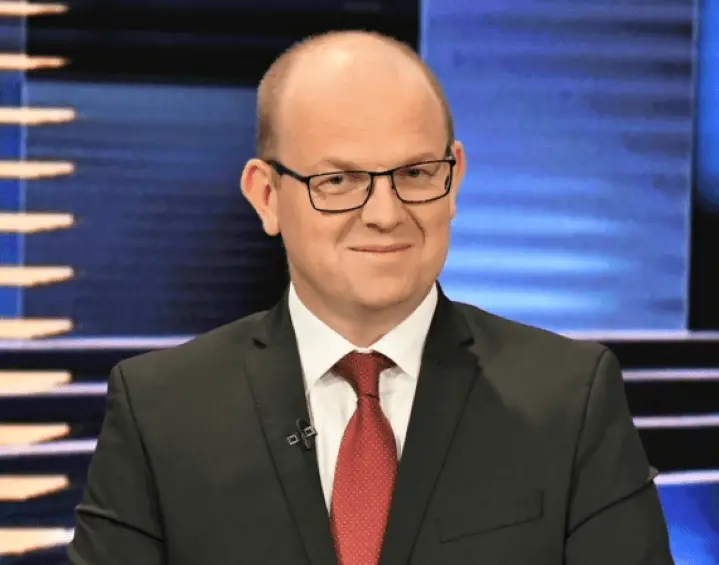
STA, 27 May 2019 - State secretary at the Defence Ministry Klemen Grošelj (LMŠ/ALDE), who has been elected to the European Parliament for the first time, has told the STA that as an MEP he would strive for solidarity and security, as highlighted in his campaign.
"I believe that the EU must remain a place of security where internal cohesion and solidarity among EU member states and citizens will be built," Grošelj said after the partial official results were released.
Asked about his future MEP career, the newly-elected Grošelj did not elaborate further, saying he had not considered possible committee engagements yet.
The 43-year-old was pleased that voters had placed trust in him and the Marjan Šarec List (LMŠ). Prior to starting his MEP term, Grošelj said he would like to complete certain duties at the Defence Ministry.
Elected as the second-placed on the LMŠ slate, Grošelj said he welcomed the positive trend of the liberal democracy idea, describing it as striving for "an open society which is not based on exclusion and intolerance" and counterweighting certain extremist or populist forces on the rise.
"A strengthened European centre indicates the strengthening and further development of the European idea, which, as we should keep in mind, is essential for the European peace and prosperity enjoyed by us today," pointed out Grošelj.
Tanja Fajon will fight against intolerance
Fajon, 48, won her third term in the European Parliament as the party's leading candidate after leapfrogging in 2014 SD leader Igor Lukšič with the help of preference votes. The only SD MEP in 2014-2019, Fajon has been a member of the committee on civil liberties, justice and home affairs and a member of the delegation for relations with Bosnia-Herzegovina and Kosovo. MEPRanking.eu, a quantitative analysis of MEP activity, shows she has been overall the busiest Slovenian MEP and one of the 101 most active ones. In her first term, she strongly advocated visa liberalisation for the Western Balkans, which earned her the title of honorary citizen of the Sarajevo canton earlier this year. As one of the vice-presidents of the Socialists and Democrats (S&D), she was mentioned in 2018 as a potential successor to S&D president Gianni Pittella. Fajon graduated in journalism in Ljubljana and continued her studies at the University of Paris, where she obtained a master's degree in international politics in 2005. She joined the public broadcaster RTV Slovenija in 1995 and was posted to Brussels as a correspondent for eight years before she entered politics in 2009 to successfully run for a seat in the European Parliament. She is married, but has no children.
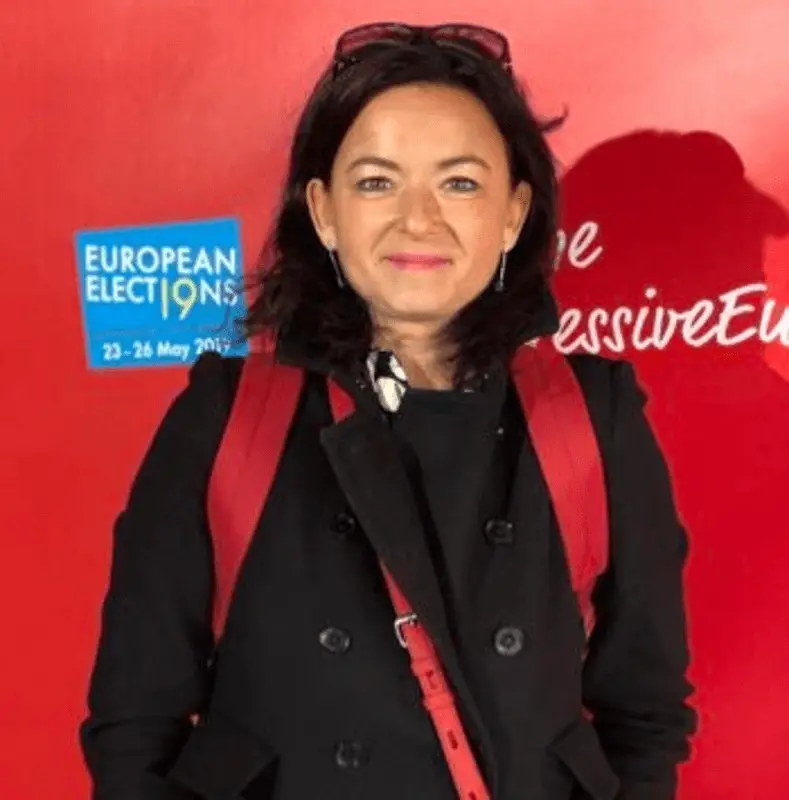
Tanja Fajon will fight against intolerance
Fajon, 48, won her third term in the European Parliament as the party's leading candidate after leapfrogging in 2014 SD leader Igor Lukšič with the help of preference votes. The only SD MEP in 2014-2019, Fajon has been a member of the committee on civil liberties, justice and home affairs and a member of the delegation for relations with Bosnia-Herzegovina and Kosovo. MEPRanking.eu, a quantitative analysis of MEP activity, shows she has been overall the busiest Slovenian MEP and one of the 101 most active ones. In her first term, she strongly advocated visa liberalisation for the Western Balkans, which earned her the title of honorary citizen of the Sarajevo canton earlier this year. As one of the vice-presidents of the Socialists and Democrats (S&D), she was mentioned in 2018 as a potential successor to S&D president Gianni Pittella. Fajon graduated in journalism in Ljubljana and continued her studies at the University of Paris, where she obtained a master's degree in international politics in 2005.

STA, 27 May 2019 - Tanja Fajon (SD/S&D), who has won her third term in the EU Parliament, would like to continue the work she was doing in her previous terms, fighting for human rights and against intolerance, xenophobia, hatefulness and fake news. "I will strive for a socially fair Europe," she told the STA.
After the announcement of the partial official EU election results on Sunday, Fajon thanked voters who, according to her, provided a lot of support to her.
Being asked about the future of her political career, the 48-year-old MEP replied that she would gauge the situation upon her return to the Parliament.
Fajon was also pleased that she would be joined there by another candidate from the Social Democrats' (SD) slate, Milan Brglez, since together they will constitute "a bit stronger delegation than in the past".
The re-elected MEP wishes for a socially fair Europe, a goal she said she was already pursuing in her previous term as a member of the Parliament's Committee on Civil Liberties and Committee on Tax Rulings.
"I assume I will remain active in the same areas in my new term, but that will, of course, be determined by the leadership of the S&D political group," said Fajon, one of the vice-presidents of the Socialists and Democrats (S&D).
Looking back at the EU election campaign, she estimated that Slovenians were mostly concerned with how to maintain their standard of living.
"We're talking about decent life, social justice, tax justice and protection of the environment, which has turned out to be important especially through young people's actions, actively supported by myself," said Fajon.
She plans to continue to strive for achieving sustainable equality in Europe. She believes Europeans are facing numerous issues, including political, economic and social ones, which will have to be addressed and tackled.
All the articles in this series are here
Joveva will promote the interests of young people in EU Parliament
Irena Joveva, 30, is a political newcomer and the youngest of all Slovenian MEPs. Leaving a career in journalism to stand in this year's EU elections, she has been criticised for lack of experience in politics, but defended herself by saying it is time for new faces and new approaches. Joveva, who holds a master's degree in international relations, started her career at the Slovenian Press Agency's home policy desk and received the Slovenian Journalists' Association's award for best young journalist in 2014. She then moved to private broadcaster POP TV to cover home affairs. Although many know her from the TV screen, she admitted the invitation to headline the ticket of the party of Prime Minister Marjan Šarec came as a surprise. She says experience is not the only thing that matters in politics, as those criticising her for the lack of it have many experiences but have failed to bring change for the better. Joveva, of Bulgarian and Macedonian descent, is a basketball fan and cheers for North Macedonia, except when they play against Slovenia.
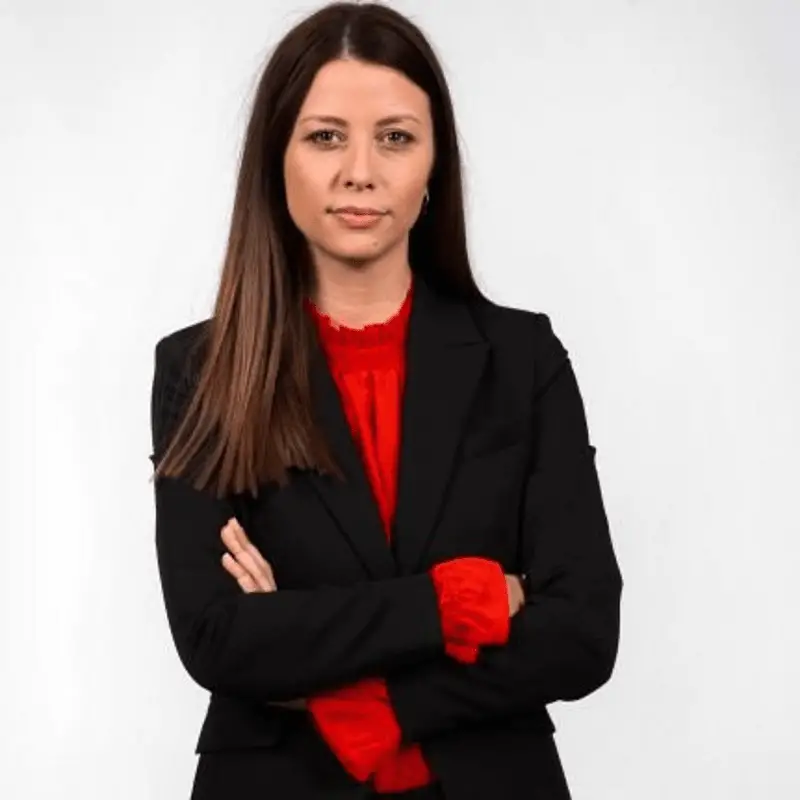
STA, 27 May - Irena Joveva, a former journalist who was elected MEP as the frontrunner of the ruling Marjan Šarec List (LMŠ), plans to promote social issues and the youth in the European Parliament. She would like to cooperate with parties and political groups that share LMŠ's views and are foremost pro-European.
Joveva is a political novice and the youngest Slovenian MEP to date. The 30-year-old former journalist called for a new mindset during the campaign.
Being the LMŠ's lead candidate, Joveva told the STA she had been relieved when she heard the election results. "It was very nice to see our percentage and especially the number of our MEP seats," she said.
The second candidate on the LMŠ's list, Klemen Grošelj, was also elected MEP in what was the first EU election for the party.
"I'll need some time to fully grasp what actually happened," she said.
She will not have a lot of time to process things though, as her first meeting with the Alliance of Liberals and Democrats (ALDE) is scheduled for Tuesday.
She thinks it is too early to talk about her work in committees but she will be active in social affairs and the youth.
Being young herself, she feels she will be in a better position to advocate the interests of young people. But she will also promote the interests of the elderly, and deal with environmental issues, and common foreign and security policy.
She is open for cooperation with everyone and hopes Slovenian MEPs will be more united in this term. She would like new faces in politics to attract more people to the polls in five years.
The LMŠ won 15.58% in what was the first EU election for the party, which was founded just before the 2018 general election.
Franc Bogovič to focus on smart villages
Franc Bogovič, 56, was re-elected as the fourth-placed on the joint list of the opposition SDS and his People's Party (SLS). He was first elected MEP in 2014 on the joint New Slovenia (NSi) and SLS slate with preference votes from last place on the list. At the time, he was the SLS leader and an MP. As MEP, Bogovič, who has a degree in agronomy, has been active in promoting digitalisation in agriculture. Although he led the SLS for just over a year, he is a party stalwart as a founding member of the SLS's predecessor, the Slovenian Farmers' Union, established in 1988. Before being elected Krško mayor in 1998, a post he held for 13 years, he served as local councillor for nearly a decade, but first came to national prominence as a member of parliament in 2008-2011. After the snap election of 2011, he served as agriculture minister on Janez Janša's short-lived government for a year. When he took over the SLS in March 2013 from Radovan Žerjav, he steered it back to its rural roots and pursued a conciliatory policy that helped the party forge close ties with the NSi. He is married and has three children.
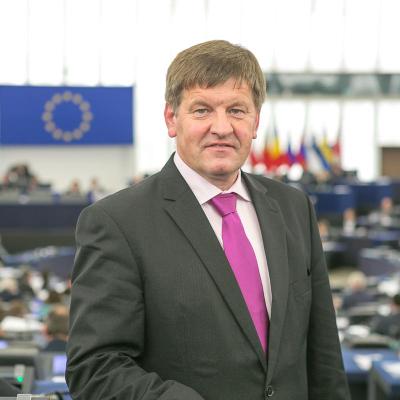
STA, 27 May 2019 - MEP Franc Bogovič (EPP/SLS), who was elected for another term on the joint slate of the Democrats (SDS) and the People's Party (SLS), says he will continue his line of work in Brussels. "It takes a while before you get connected, before people get to know you and trust you," he said, adding that he would stay true to himself.
Bogovič would like to continue his work in the committee on agriculture and rural development, and on regional development. He would also like to join the transport and energy committee.
Apart from participating in the three committees, he plans to promote the project of smart villages, which he thinks sums up his efforts in the European Parliament so far.
According to Bogovič, funding for this project has been secured in the next multi-annual financial framework, and now these funds need to be phased. Slovenia should be a pioneer in this field, he believes.
He is confident that pro-European parties - the European People's Party (EPP), Socialists (S&D), liberals and the greens - will successfully form a coalition that will have a majority in the new parliament, form the new commission and continue with European projects.
"Together we will make sure Europe will be doing well and that those who come to the European parliament only to break the EU will remain marginalised."
Asked whether Brexit could still be prevented, he said this was a question primarily for the British. "There has been so many twists already that Europe does not understand them any more. I think they don't know what they're doing themselves and all this is not good for anyone."
Noting that the UK is one of the largest and most important economies, he expressed hope that it changes its mind about leaving.
All the articles in this series are here (if they're not online yet, come back soon, as this is just part one)
STA, 27 May 2019 - Political analysts believe the opposition Democrats (SDS/EPP) are in a way a loser of this year's EU vote even if their joint slate with the SLS has won three MEPs and the largest share of the vote. Andraž Zorko and Rok Čakš have however pointed to the success of the Social Democrats (SD/S&D), which have gained one seat.
Although the victory of the joint slate of the SDS and the People's Party (SLS) is convincing, the SDS is actually a loser: it will have one MEP less, since the third one is a member of the SLS, Zorko of pollster Valicon told the STA.
"Even without pairing up with the SLS, the SDS would have won enough votes to secure three seats", as was the case in the 2014-2019 term, believes Zorko.
Agreeing that three SDS+SLS seats somewhat overshadowed the fact that compared to 2014-2019, the SDS has lost one MEP, Čakš believes that by joining forces, the SDS+SLS "took the key step towards victory". He noted the SLS had contributed one MEP and added a significant 5% to the outcome.
Zorko believes the Social Democrats (SD) may be considered the biggest winner, not only picking up an extra seat but nearly trebling the number of votes compared to five years ago.
On the home ground, the SD's result strengthens this coalition party against the LMŠ of PM Marjan Šarec and further weakens the position of the coalition Pensioners' Party (DeSUS) and especially of the Modern Centre Party (SMC), said Domovina portal editor Čakš.
Both Zorko and Čakš, meanwhile, believe the Marjan Šarec List (LMŠ) did well, winning two seats in its first EU elections.
"The LMŠ has broken through with two MEPs apart from winning around 74,000 votes, which is an above-average index compared to the general elections," said Zorko.
The analysis are however unanimous in that the opposition Left is the biggest loser, having made several mistakes during the campaign.
"It had an excellent starting position and a spitzenkandidat at EU level, but with awkward moves during the campaign it squandered a seat it was practically already secured," said Čakš.
Zorko believes the Left's biggest mistake was its first-seeded candidate, MP Violeta Tomić, who did not do well in the EU arena.
Another loser is according to Zorko the Pensioners' Party (DeSus) and its leading candidate, outgoing MEP Igor Šoltes.
"It actually lost twice," said Zorko, noting DeSUS lost a seat it had in 2014-2019 (its MEP Ivo Vajgl did not stand for re-election) and Šoltes lost his own seat.
The election outcome has also brought change to the Slovenian centre-right parties, as the centre-right has lost one seat to have four, just as the centre-left parties.
Čakš attributed the fact that the centre-left had gained one seat to its successful campaign in districts where it is strong.
Otherwise there are no major winners or losers among other parties, though Zorko pointed to a small victory for the SMC.
Although its election result is relatively poor, it regained the seat in the Slovenian parliament it lost when its MP Milan Brglez defected to the SD.
Since he was now elected MEP, his seat will be filled by a SMC stand-in deputy because he was elected on the SMC slate last year.
With one MEP, the NSi is where it was five years ago, the only difference being that its new MEP is a woman. "They lost nothing by not joining forces with the SLS, but they were not far from winning a second MEP," said Zorko.
And it was perhaps premature to put a member of the Slovenian minority on the slate in Slovenia, Zorko commented on the Alenka Bratušek Party's (SAB) choice of its frontrunner Angelika Mlinar. "The experiment has fallen through."
STA, 27 May 2019 - The conservative list of the Democrats (SDS) and People's Party (SLS) won Sunday's EU election in Slovenia ahead of two leftist coalition parties, but the conservative bloc lost some ground overall as voters delivered a mixed message that was neither a rejection of politics-as-usual nor an embrace of populism.
The SDS+SLS list won 26.5% of the vote and three MEPs, the coalition Social Democrats (SD) and Marjan Šarec List (LMŠ) got two MEPs each with 18.6% and 15.6%, respectively, with the opposition New Slovenia (NSi) getting 11.1% and one seat.
MEPs Milan Zver, Romana Tomc and Franc Bogovič won re-election on the SDS+SLS slate, and Tanja Fajon was re-elected MEP for the SD. The remaining four will be novices.
Somewhat surprisingly, Milan Brglez, a former speaker of parliament, was elected second MEP from the SD slate thanks to preferential votes.
For the LMŠ, front-runner Irena Joveva and second-placed Klemen Grošelj were elected, while Ljudmila Novak will return to Brussels after ten years as the only deputy for the NSi.
The SDS declared resounding victory, with party leader Janez Janša stressing that this was the result of the only tie-up between two parties in this election, one which could also serve as a model for future ballots.
Speaking about the third election victory for the party in a year, Janša stressed that this was the only list to join forces for this election and deservedly won a plurality of the vote.
The LMŠ counts its performance a success as well, having risked it all by rejecting a joint liberal list with the Modern Centre Party (SMC) and Alenka Bratušek Party (SAB).
Prime Minister Marjan Šarec said the party had succeeded with a platform-based campaign instead of dealing with others. "We're also happy that this campaign proved to be successful for the parties which feel Europe, which do not ostracise."
The SD doubled their number of MEPs as Fajon, who will serve her third term, will be joined by Brglez, a political science professor who served as speaker of parliament in 2014-2018.
"I'm very happy that we've managed to double our seats and that we're going back with two MEPs... I hope we'll be able to form a progressive majority in the European Parliament, allowing us to achieve the changes we want," said Fajon.
The Left and DeSUS were major surprises, winning respectively 6.35% and 5.65% even though both were projected to be much closer to winning a seat and DeSUS having had an MEP in the 2014-2019 term.
But while Left leader Luka Mesec acknowledged the outcome was a disappointment, DeSUS leader Karl Erjavec said the result was not bad.
The other parliamentary parties performed dismally as well. The National Party (SNS) and the SAB were virtually tied at 4.01%. The Modern Centre Party (SMC) was far behind with 1.58%, having been overtaken by two green parties and the far-right Homeland League (DOM).
Overall, the election produced a slight shift as the conservative camp went from having five MEPs to four, with the liberal-left bloc picking up a seat thanks to the SD.
Analyst Andraž Zorko said the SDS was actually the loser of the election despite the overall win, as they will have one MEP less, while the SD may be considered the biggest winner, not only picking up an extra seat but nearly trebling the number of votes compared to five years ago.
The vote also allayed fears about a feared populist surge, as the most hard-line parties barely made a dent.
The populist SNS won a slightly smaller share of the vote than in last year's general election, an indication that it has limited appeal, while the hard-right Homeland League (DOM), which campaigned on a radically anti-immigration platform, got less than 2% of the vote.
Turnout, at 28.3%, was almost four points higher than in 2014 but still well below projections and significantly lower than in the EU on average.
Political analyst Marko Lovec blamed this on parties failing to provide good candidates: instead of fielding good candidates, Slovenian parties used the vote as an opportunity to resolve internal issues.
STA, 26 May 2019 - The joint list of the Democrats (SDS) and People's Party (SLS) won Sunday's EU election in Slovenia ahead of two coalition parties, but the overall balance of power in the Slovenian EU Parliament has shifted to the left.
The SDS+SLS list won 26.5% of the vote and three MEPs, the coalition Social Democrats (SD) and Marjan Šarec List (LMŠ) got two each with 18.6% and 15.6%, respectively, with the opposition New Slovenia getting 11.1% and one MEP seat.
MEPs Milan Zver, Romana Tomc and Franc Bogovič won re-election on the SDS+SLS slate and Tanja Fajon was re-elected MEP for the SD, but the remaining four will be novices.
Somewhat surprisingly, Milan Brglez, former speaker of parliament, was elected second MEP from the SD slate thanks to preferential votes.
For the LMŠ, front-runner Irena Joveva and second-placed Klemen Grošelj will serve in parliament, while Ljudmila Novak will return to Brussels as the only deputy for the NSi.
The SDS declared resounding victory, with party leader Janez Janša stressing that this was the result of the only tie-up between two parties in this election, one which could also serve as a model for future ballots.
Nevertheless, the conservative camp has gone from having five to four MEPs, as the SD picked up one more and the LMŠ got two in what was its first EU vote.
This was despite the fact that the Left and Pensioners' Party (DeSUS) narrowly missed the threshold, respectively with 6.35% and 5.65%, even though both were projected to be much closer to winning a seat.
The National Party (SNS) and Alenka Bratušek List (SAB) were virtually tied at 4.01%. The Modern Centre Party (SMC) was far behind with 1.58%, having been overtaken by two green parties and the far-right Homeland League.
The results are almost final, but several hundred mail-in ballot will be added to the tally in the coming days.
STA, 24 May 2019 - All the latest public opinion polls ahead of Sunday's EU elections see the joint list of the Democrats and People's Party (SDS+SLS) as the front runner, followed by the Marjan Šarec List (LMŠ) and Social Democrats (SD).
New Slovenia (NSi), the Left and the Pensioners Party (DeSUS) also appear to be serious contenders for an MEP seat, while the prospects of the Alenka Bratušek Party (SAB) and National Party (SNS) seem to be more remote.
Overview of the latest public opinion polls ahead of the 26 May elections to the European Parliament
Ninamedia* Valicon** Parsifal*** SDS-SLS 25.0 22.1 16.4 LMŠ 20.6 18.9 15.5 SD 15.0 15.8 12.6 NSi 10.4 7.7 3.3 Left 8.3 5.9 4.1 DeSUS 7.3 5.5 7.4 SAB 4.3 5.0 2.8 SNS 3.2 6.2 3.3 Greens of Slovenia 2.5 2.8 0.5 SMC 1.5 4.0 0.2 Let's Connect 0.7 1.2 0.8 Good State 0.5 1.8 0.9 Homeland League 0.4 1.9 0.5 ZSi 0.3 1.1 0.4 Don't know / / 28.9
*Ninamedia: projection based on telephone poll conducted between 20-23 May, 675 respondents
**Valicon: projection based on web panel survey on 21-22 May, 1,012 respondents
***Parsifal: poll conducted 20-22 May, 683 respondents, undecided voters included in final tally
STA, 24 May 2019 - The Ibiza corruption scandal in Austria, the proposed setting up of mixed Slovenian-Italian border patrols and populism were the main topics of the last EU election debate aired by the public broadcaster RTV Slovenija on Thursday evening.
Commenting on the scandal that swept away the Austrian vice-chancellor and leader of the Freedom Party (FPÖ), Carinthian Slovenian Angelika Mlinar of the Alenka Bratušek Party (SAB) said the case illustrated that a state could not be build by populists.
Such parties are demolishing democracy, she said. Tanja Fajon of the Social Democrats (SD) agreed, adding that this was an attempt to destabilise the EU from the outside.
The top candidate of the Left, Violeta Tomić, believes the scandal has "blown the right populists' cover".
Gregor Perič of the Modern Centre Party (SMC) and Irena Joveva of the Marjan Šarec List (LMŠ) strongly condemned the corruption scandal. New Slovenia (NSi) frontrunner Ljudmila Novak also called for zero tolerance for corruption and wondered who financed the left.
Romana Tomc of the joint list of the Democrats and People's Party (SDS+SLS) stressed the importance of the consequences of the scandal, that is the resignation of Heinz-Christian Strache.
Zmago Jelinčič of the National Party (SNS) said corruption was a reality. "Some get caught, others don't," he said, adding that Strache had probably gotten caught in a trap set up by intelligence services.
Igor Šoltes of the Pensioners' Party (DeSUS) said that when he was in charge of the Slovenian Court of Audit several suspected cases of corruption had been detected. "But the problem is that nothing happens," he said.
All candidates said they had never been involved in corruption and than argued about which political pole controls the media.
The candidates of non-parliamentary discussed similar issues in a debate that followed that featuring parliamentary parties.
Gorazd Pretnar of the Greens said one way to eradicate corruption would be to limit the access of lobbyists to MEPs.
Urša Zgojznik of Let's Connect disagreed, and proposed protecting those who are discovering corruption.
Andrej Šiško of the far-right United Slovenia (ZSi) thinks MEPs should be dismissed for even the slightest slip, while Bernard Brščič of the Homeland League (DOM) would eradicate corruption by not having all the power concentrated in Brussels.
The candidates of the parliamentary parties also commented on the proposal by Foreign Minister Miro Cerar for joint police patrols on the border with Italy. Only the candidates of the LMŠ and SMC backed the idea.
Joveva (LMŠ) said this would be a sign of neighbourly cooperation, while Perič (SMC) said the move was to prevent Italy from following Austria's example and reintroducing checks on its borders with Slovenia.
Other candidates do not support Cerar's proposal. Tomc (SDS) thinks such patrols should be set up along the southern border with Croatia, which was echoed by Jelinčič (SNS).
Fajon (SD) too opposes patrols on the internal Schengen borders and calls for a joint migration policy. Mlinar (SAB) sees no point in the joint patrols on the Slovenian-Italian border.
Šoltes (DeSUS), Tomić (Left) and Novak (NSi) are not impressed either. "Let's protect our external borders, so internal borders could be open," Novak stressed.
The candidates of non-parliamentary parties also talked about populism and the future of the EU with Brščič (DOM) saying that populism was a positive thing. "We need less Brussels and more Europe, and that's exactly what we're offering," he said.
Pretnar (Greens) said the remains of the post-crisis extremism would be represented in the European Parliament but added that they posed no threat as no new crisis was on the horizon.
Zgojznik (Let's Connect) was quick to add that a new crisis was in fact on the horizon, an environmental crisis. She also warned against the so-called green populism.





